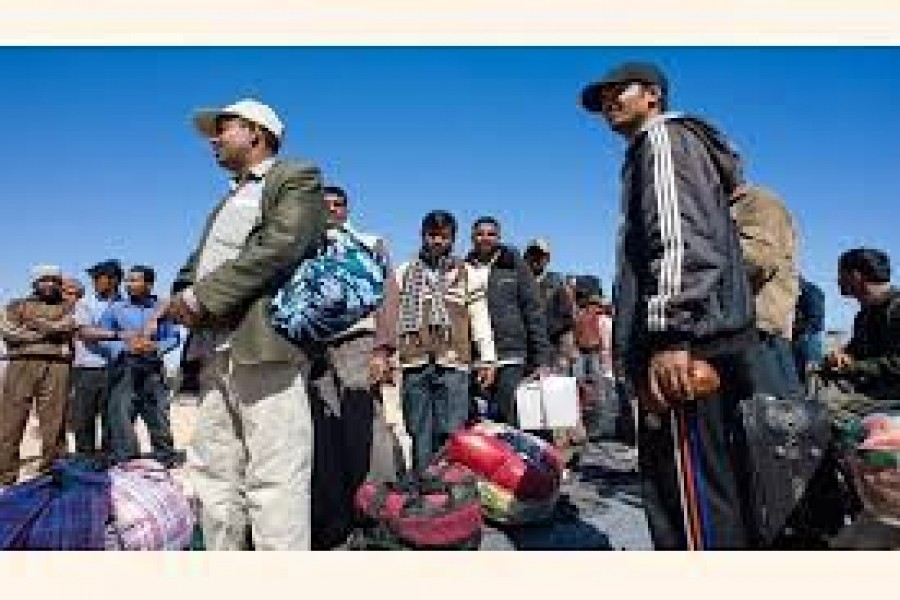More than 165,658 workers returned home from 29 countries between April 01 and September 30 this year due to various reasons. According to a report, such hapless expatriates were forced to return in the face of situations like job cuts, irregular status and expiration of their job contracts.
However, the country's Expatriates' Welfare and Overseas Employment Minister Imran Ahmad said recently that the number of Bangladeshi migrant workers returning from abroad due to the global coronavirus pandemic and other reasons is not 'alarming'.
According to him, a small number of Bangladeshi workers, who were in deportation centres due to coronavirus pandemic, have returned as different countries have deported irregular workers.
The minister said it was feared that the economic recession and the coronavirus would disrupt the labour markets of the major employer countries, leaving many workers unemployed. The number of returnee workers, however, has not become alarming.
The number of Bangladeshi workers abroad is more than 10 millions. Many workers had to return home because of the pandemic. The number of people returning to the country would be around 0.27 million.
But the real scenario is that the overseas employment sector for Bangladeshis is bleak with thousands of migrants in the dark about their jobs due to coronavirus pandemic.
However, the jobless workers' homecoming continues unabated. Also,those who returned to the country on leave before the virus outbreak remain stranded in the country.
Such a volatile situation is having an impact on remittance earnings in the coming days. On the other hand, most of the estimated 100,000 workers 'on leave' are yet to return to their worksites for travel ban imposed by destination countries. Even visa and iqama of many workers have expired.
According to migration experts, the overseas employment sector is passing through a deep crisis. Workers are struggling to save their livelihood. If the crisis is not managed properly, it will impact employment as well as foreign remittance, they observed.
There is no denying that the country is getting a good amount of remittance earnings during the pandemic. The government's 2.0-per cent incentive has contributed to the overall remittance income since 2019.
But the current trend appears not to be normal. The trend suggests that the migrants are remitting more as many are closing businesses or investments before returning from the Middle East.
Workers are, according to reports, trying to send remittance as much as possible as they are also worried about job cuts in the oil-rich Middle-Eastern countries. Hundi, visa trading, illegal trade have declined in corona time. So, remittance income has got a big jump through formal channel in recent months.
But, such a trend will not continue for long. According to experts, the government should take effective measures to protect the sector.
Most of the returnees who are from the United Arab Emirates number 44,616followed by Saudi Arabia 39,188, Qatar 14,911, Oman 10,713, the Maldives 10,483 and Kuwait 9,997, according to reports.
Due to economic cost of Covid-19, labour-receiving countries started job cuts. So many Bangladeshis have lost jobs. Besides, the workers who went abroad recently could not manage jobs.
More than 50,000 workers came from Saudi Arabia on leave before coronavirus outbreak. They are facing uncertainty over restarting their work. Saudi Arabia has extended the validity of iqama for Bangladeshis by 24 days. But workers said most of them cannot go there as they cannot extend validity of visa.
The validity of visa for Saudi-bound workers expired recently, but many of them could not contact their sponsors for procedure seeking visa extension. At least 120,000 workers who were in the pipeline of going abroad with jobs also failed to do so.
Local manpower recruiters said chances are slim about sending workers abroad as job markets will not take in workers soon. The country obviously lacks coordination and monitoring system in migration management.
Analysts suggest that the government should strongly deal with the matter diplomatically with job destination countries to take back the stranded workers. Fresh job opportunities also need to be created for overseas job seekers. The government should plan a proper reintegration programme for jobless returnees.


